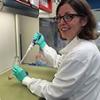Increasing the yield of crop plants is a major facet of increasing food security, and one way to do this is from understanding plant biology. Once we understand the underlying biology, we can optimise those inputs key to plant growth, and minimise disruptive factors, as well as ensuring plants are resilient to potential climate changes. Within the Initiative, this is approached from the study of several aspects of plant biology: from the study of insect pests, and how they spread diseases; of efficient forms of photosynthesis, and of how epigenetically encoded variation can be exploited in breeding, as well as how RNA silencing can act in development.
This theme also encapsulates work on optimising the extraction of lignocellulosic biofuels from plant waste, in order to relieve the food vs fuel dilemma, as well as work on archaeobotany and archaeogenetics, in the context of the broader archaeology of food.






































